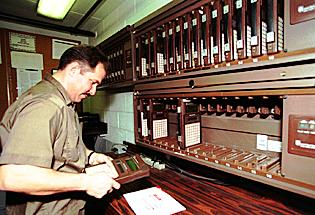
Driver Mike Wheeler uses a computerized device to scan a package at a UPS office in Livonia. UPS has built Internet connections that let its customers track about a million shipments each week. (Free Press photo by William Archie)
How we will buy tomorrow
UPS chief sees consumer rule over business
January 22, 1999
BY MIKE BRENNAN
Free Press Business Writer
A huge new wave of consumerism triggered by an explosion of electronic commerce will force businesses around the world to respond or get swept away.
You'd expect to hear these words from Bill Gates or one of the other prophets of the Internet. Instead, they came this week from the chief executive officer of United Parcel Service, a century-old package delivery company.
UPS Chairman James Kelly told the Economic Club of Detroit that UPS does business where the virtual world of the Internet and the physical world collide. The Atlanta-based company, with nearly 10,000 Michigan employees, is perfectly placed to take advantage of "what may be the best business opportunity in a century," Kelly said.
"I consider the Internet the ultimate tool for consumer activism, far more powerful than a thousand Ralph Naders or congressional acts could ever hope to be," Kelly said. "It turns the retail model on its head, twists its dynamics and puts teeth into at least the two greatest truths that business people have been treating like bromides and platitudes for years: 'The customer is king,' and 'People are our most valuable resource.' "
The holiday season proved these maxims to UPS, Kelly said. The week before Christmas, consumers spent $2 billion shopping on-line. Because UPS is the shipper of choice for 10,000 Web business sites, delivering kept the company busy. That's why UPS spends about $1 billion a year on computer technology, more than it spends on big brown delivery trucks.
Consumers told researchers that, aside from security concerns, the biggest features they looked for on-line were on-time delivery and full-service sites that include one-click shopping -- clicking on a "buy now" button and having delivery taken care of by the site.
By 2003, on-line sales will pass the $100-billion trade in traditional catalog sales, Kelly predicted.
What the Internet does particularly well is deliver information and power to everyone who uses it, Kelly said.
Pull, not push
"When push comes to shove, the real fallout of the information revolution comes when the consumer pulls out the wallet. That's where technology changes the dynamics and lets the consumer pull product out of us, instead of us pushing product on the consumer."
The Internet has made the customer the king at last, he said. That will intensify with new Internet tools under development. One, called a Dynamic Coalition-Building Agent, aggregates people looking for the same products into a huge group demanding wholesale prices.
"The old push model is doomed -- where customer preferences get filtered through all the agendas of the supply chain, and where the production cycle ends up serving suppliers instead of the end user. In its place comes the pull model, where consumers elicit products and services out of the supply chain. We jump through hoops, making direct electronic connections to the party who pays, the end customer who's armed with information, money, an opinion and a choice."
Connections
UPS saw this trend years ago and started building new technology products to deal with these changes, Kelly said. The company has developed mainframe connections to its largest customers to help them manage production cycles, fulfillment, payables, receivables and even customer service.
UPS also has built Internet connections that let its customers track about a million shipments each week. Plus it's developed an electronic delivery service that sends documents worldwide in seconds. The system includes third-party verification that certifies the documents came from the sender and arrived securely.
Other package delivery services, such as Federal Express and the U.S. Postal Service, have made similar moves into the Internet.
But no matter how wonderful the technology is, it's the people behind the technology who make the difference, Kelly said.
"Take out the human touch, and technology is worthless. Take out service, quality and customer relationships, and your business soon will be worthless."
Into the future
UPS's formula for success in the future is getting people to use new technology to win business and so enhance customer relationships.
Kelly pointed to words recently written by Forbes publisher Rich Karlgaard, who listed six developments he predicted would drive business in the coming decade. Kelly said all six are a direct result of electronic commerce.
"The bottom line is all these forces bring power to the person," Kelly said. "They give our old platitudes real bite. They give consumers a loud voice. And they compel us to listen."
Mike Brennan writes about technology companies, computers and the Internet. He can be reached at 1-313-223-4410 or through E-mail at brennan@freepress.com
A LOOK AT UPS
World headquarters: Atlanta.
Founded: Aug. 28, 1907, in Seattle.
Service area: 200 countries and territories.
Daily air-delivery volume: 1.8 million packages and documents.
Airports served: 391 in the United States; 219 international.
Employees: 296,000 in the United States; 35,600 international.
Aircraft: 500.
Delivery fleet: 157,000 package cars, vans and tractor-trailers.
Number of technical employees: 4,000.
Data centers: Mahwah, N.J., and Atlanta.
Mainframe computers: 14.
Midrange computers: 390.
PCs: 165,000.
UPS Global
Telecommunications Network
Countries: 70.
Users served: 500,000.
Packages tracked electronically: 11 million or more daily.
Cellular calls: one million daily
Fiber optic and satellite dedicated lines: 3,000.
Source: UPS

All content © copyright 1999 Detroit Free Press and may not be republished without permission.